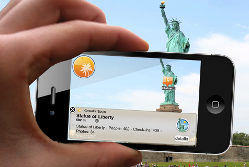Four business tech trends to watch in 2012
 What’s in store for business technology in the year ahead? We ask four IT experts to pick the tech trends which will be important to you in 2012
What’s in store for business technology in the year ahead? We ask four IT experts to pick the tech trends which will be important to you in 2012
1. Buying on the move will be big
“Next year is when small businesses will really start to embrace mobile commerce,” predicts Nick Kington, managing director at e-commerce provider SellerDeck. Mobile commerce means making it easy for visitors to purchase from your website on their mobile phone.
 "This trend will be driven by a surge in mobile internet access," says Nick. “Mobile internet use will continue to increase. People are using mobile devices in place of their desktop computers.” A survey earlier this year found that 45% of UK internet users are going online via mobile phones, up from 31% in 2010.
"This trend will be driven by a surge in mobile internet access," says Nick. “Mobile internet use will continue to increase. People are using mobile devices in place of their desktop computers.” A survey earlier this year found that 45% of UK internet users are going online via mobile phones, up from 31% in 2010.
Large retailers like Amazon and Argos have led the way with mobile-friendly websites. “People want to purchase in the same way from smaller sites,” argues Nick. “That’s why next year is when smaller businesses will really start to embrace it.”
2. The internet will go local
 “Even though we do so much online, people still like to feel like things are local,” says Craig Sharp from IT support company Abussi. He predicts that location services are poised for growth.
“Even though we do so much online, people still like to feel like things are local,” says Craig Sharp from IT support company Abussi. He predicts that location services are poised for growth.
Most smartphones are equipped with global positioning system (GPS) chips which enable them to determine their position. Many applications make use of these ‘location services’ ― for instance, by pinpointing your location on a map.
He envisages a world where location services are combined with augmented reality, a technique for overlaying virtual information onto an image of the real world. The faster processing power of the latest smartphones allows such applications to run in real-time.
|
Image courtesy of WIKITUDE. |
Craig describes a possible scenario: “As you walk down your local high street, an image on the screen could show the shops as you pass them, with bubbles popping up to show you deals. That’s feasible with existing technology.”
3. Tablet computers are here to stay
One of the most-discussed pieces of IT of the past year has been the tablet computer. Although Apple has led the way with its iPad, there’s still something of a question mark over whether these devices have a place in the business world.
 But for Doug Richard, former Dragon and founder of School for Startups (currently running a series of free Web Fuelled Business bootcamps), there’s no argument.
But for Doug Richard, former Dragon and founder of School for Startups (currently running a series of free Web Fuelled Business bootcamps), there’s no argument.
He says the tablet computer can be something of a Swiss army knife for smaller companies: “Start-ups and small businesses will discover they can replace everything from cash registers and mobile phones to desktop computers and sales kiosks with tablet computers.”
With add-ons like card readers, keyboards and docking stations available, could the tablet computer become a dominant piece of business tech?
“These devices are cheap and there is a growing army of tools that make it easier to develop applications for them,” argues Doug. “There is no business they will not impact in the months to come.” Perhaps some retailers will take their cue from Apple itself, which has replaced in-store printed product information with iPads.
4. Businesses will centralise computing power
 Jonathan Edwards runs Harrogate-based IT company Integral IT. He thinks 2012 will see businesses moving away from the traditional IT setup, where each employee gets their own desktop computer.
Jonathan Edwards runs Harrogate-based IT company Integral IT. He thinks 2012 will see businesses moving away from the traditional IT setup, where each employee gets their own desktop computer.
Instead, he sees businesses switching to desktop virtualisation, which replaces the processing power of individual PCs with a central server. Employees access this using networked ‘thin clients’ ― cut-down computers which are little more than a keyboard, mouse and screen.
“Take a company with 50 computers,” explains Jonathan. “Each is a separate entity. Software updates need installing. It needs maintenance. That all costs time and money.”
Desktop virtualisation can replace those 50 computers with a single server and thin-client computers. “For the users, nothing much changes,” continues Jonathan. “They log on and all their applications are there. But the difference is that they’re not logging onto a PC. Everything’s happening on the server, and coming down the network cable to their terminal.
“Desktop virtualisation is about efficiency,” he clarifies. “Instead of having desktop PCs that are used to 10 per cent of capacity, you have a server that’s running at 90 per cent. In the current climate, companies have to do more with less. This is a way to achieve that.”
The tech year in review...
 We asked three small businesses what technology has made a real difference for them this year:
We asked three small businesses what technology has made a real difference for them this year:
- “Definitely Yoono as a plugin on your browser. It lets us see all our social networking feeds in one place.” Gill Millington, Biz in a Box
- "I've started using a Livescribe digital pen with Evernote. I can write notes, then upload them to Evernote and access them anywhere.” Sharon Jackson, Bay Web Designs
- “We use Dropbox ― it makes it easy to share files with clients without having to explain how to set up FTP.” John Jameson, Gloo Communications
Popular content related to tech trends for 2012:









Comments
Add a comment
Not registered? We'll create a new account for you when you add your comment